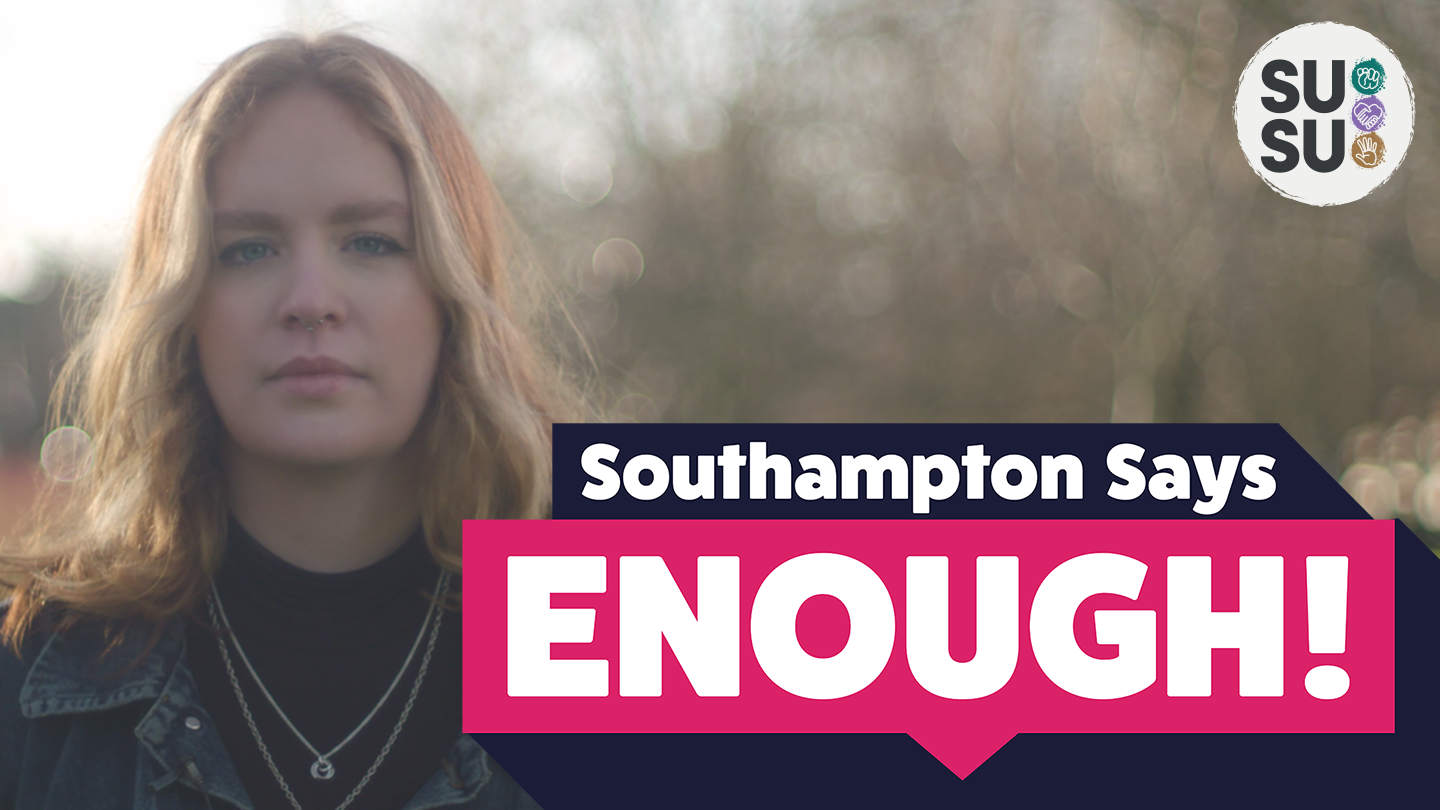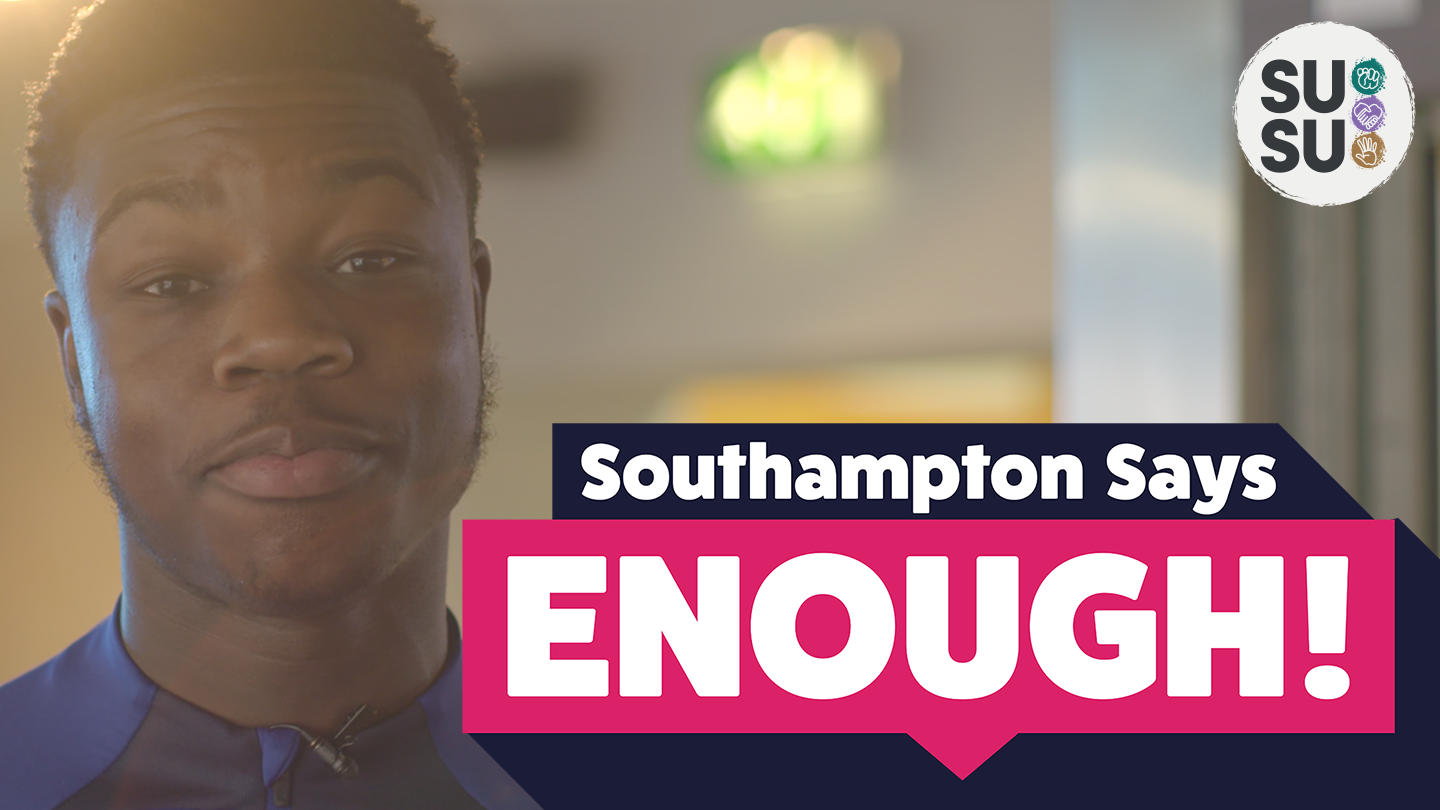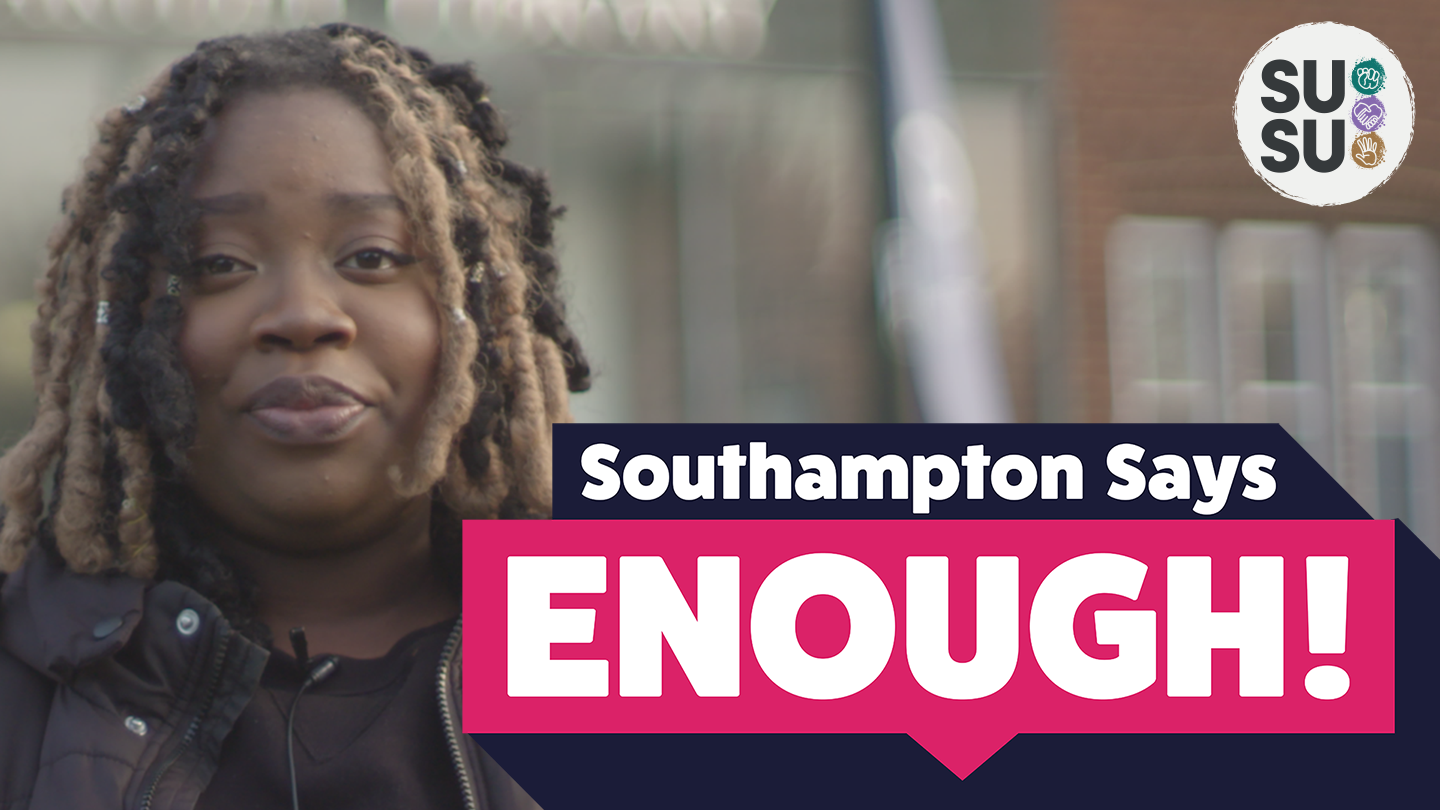
Enough is enough!
Let’s stand together against sexual violence in Southampton.
Southampton Says Enough
The Southampton Says Enough initiative is a gender-inclusive campaign that attempts to increase public awareness of sexual assault, harassment and violence in Southampton. Through working with various stakeholders across Southampton we aim to develop support systems and regulations to minimise sexual assault, harassment, and violence as well as support victims/survivors.
The campaign is inspired by the recent “Enough” campaign launched by His Majesty’s government to stop violence against women and girls. Men and members of the LGBTQ+ community can also encounter and endure sexual assault and abuse, even though women and girls are disproportionately affected by it. This campaign aims to highlight all forms of abuse and sexual violence against all individuals.
Content Warning: the content on this page discusses sexual violence and harassment. Links to organisations which can provide support on these topics can be found below on this page.
Playlist

0:43

1:00

0:16
Help and Support
If you need help and support about the topics discussed on this page, please do reach out to one of many organisations who are here to help:
OUR AIMS

Aim One
For individuals to have appropriate ways to get home from being in the night-time economy and (if a student) from late-night university/student union campus activities.
- Introduce safer bus stops.
- Work with the Violence Reduction Unit to implement a Lit Routes Scheme to provide a lit walking route home through Southampton.
- Work with Southampton City Council to implement better quality street lighting that is both environmentally and cost-friendly and adequate for purpose.
- For the University of Southampton to include the U1N within student halls bus passes and for the U1N to be subsidised or made free for students.
- For Southampton universities to implement better CCTV and more lighting on campuses.
- For Southampton universities to identify areas where students have an increased vulnerability on campuses and introduce specific measures to aid students.
- For city-centre parks to be appropriately monitored at night or closed at night.
Our Achievements
Safer Bus Stops is something the Violence Reduction Unit is exploring under the Safe Places Network program. Street lighting and CCTV was implemented in hotspot crime areas and where there were reports of members of the public and staff feeling unsafe. Part of the bid included:
- Riverside Park: installation of CCTV in the park to improve feelings of safety for Women and Girls and detect serious crime in a community area of concern.
- UHS: upgrade of street lighting in Coxford Road to cover main staff entrances and transport hubs for two hospitals, improving public safety at night.
- Empress Road: installation of 4 CCTV cameras, reducing risks of Violence Against Women and Girls against sex workers, improved safety for a primary school, and prevention and detection of crime in a hotspot area.
Lit Routes Scheme
We have made important strides towards improving safety precautions for students in densely populated areas, particularly in the town centre and halls of residence. Collaborating closely with the Violence Reduction Unit, we have successfully identified safer and lit routes for students to travel home.
By mapping late night venues, CCTV coverage, safe spaces, and lighting infrastructure, we have assessed potential routes and compared them with the council’s plans for streetlight reduction.
The Council have agreed to keep lights on in most student areas during the time when lights are turned off as a result of our persistent advocacy efforts, and we are happy to announce that the lit routes programme was put into place in April 2023. We personally walked through the area, with the crime prevention team and students, making the necessary corrections and edits, to finalise the suggested streets and routes and ensure they encapsulated student dominant areas.

Aim Two
Safe spaces, welfare teams and welfare rooms.
- Southampton City Council to make it a requirement that nightclubs and late-night venues have welfare staff and appropriate welfare training that extends beyond first aid as part of their licensing agreements. This should reflect the recommendations 132-139 of volume II of the Manchester Arena enquiry.
- Southampton City Council to make it a requirement for nightclubs and late-night venues to implement medical/safe spaces as part of their licensing agreement. To also ensure that welfare rooms are standardised across all venues and fit for purpose. This should reflect the recommendations 132-139 of volume II of the Manchester Arena enquiry.
- For businesses and nightclub venues to register with the safe spaces network and provide an adequate safe space for all.
Our Achievements
Safe Spaces in Nightclubs
The Violence Reduction Unit are happy to announce that the Safe Spaces initiative has been expanded into Southampton’s Night Time Economy (NTE), where venues like Orange Rooms, Switch, and Trilogy have already signed up as members. The Violence Reduction Unit are committed to getting feedback from venues and our students to make sure they are giving them the support they need and that the help these spaces provide meets our standards.
Safe Spaces at SUSU
SUSU have introduced a welfare team and welfare space within our venues. We have also implemented a SUSU Welfare Room, available in Building 40 Monday to Friday, 09:00 – 17:00.

Aim Three
For Southampton City Council to invest greater resources into young people’s services so young people are educated on sexual misconduct and harassment at an early age which subsequently reduces the pressure on universities and adult services in the future.

Aim Four
Introduce a Night-time Economy Forum to act as a working group between the universities, student unions and external stakeholders.
- Work with students from both Solent and the University of Southampton to discuss and review safety within the night-time economy on a regular basis.
- Use the night-time economy forum to lobby nightclubs and venues in the area to sign the student safety charter and ensure (through listening to students) they are keeping to these regulations.
- For Southampton’s key external stakeholders to work closely together to provide continuous updates on student safety within the night-time economy.
- For Southampton’s universities and students’ unions to work closely together to provide continuous updates on student safety within the night-time economy.

Aim Five
Ensure the University of Southampton has appropriate written procedures and policies on how they deal with sexual misconduct complaints and ensure there is a step-by-step guide created so students can access this information and see the processes clearly and visibly.
Request that Solent University also make the necessary amendments and standardise its policies and procedures.

Aim Six
Awareness of practical support.
- For nightclubs, late-night venues and safe spaces to have resources depicting external services for support.
- To introduce a comprehensive webpage for individuals to access safety information about the night-time economy, the VAWG agenda and this campaign.
- Southampton Student Unions and Universities to have an online presence about where to get practical support for anything to do with sexual harassment and violence etc.
- For the University of Southampton to streamline the process of reporting sexual assault and violence disclosure and to ensure that any reports are responded to within 24 hours.
- For the University of Southampton to issue clear communications outlining their response to sexual harassment and violence and lead with a zero-tolerance approach to encourage more students to come forward and report sexual harassment/violence in a safe environment.
Our Achievements
Welfare Resources for Nightclubs
The Violence Reduction Unit have started a resource kit pilot programme. These kits give venues the skills and direction they need to effectively support those in need. They act as a comprehensive “go-to” resource for all staff members. The kits include a handbook on how to react to sexual assault or violence against women and girls (Violence Against Women and Girls), a support booklet guide, and useful resources like phone chargers, sanitary items, and foil blankets are all included in the resource packs.
Welfare Resources at SUSU
The University of Southampton and SUSU have already distributed 5,000 anti-spiking devices to students, and we continuously stock anti-spiking devices within our venues to keep students safe. SUSU also distributed anti-spiking test strips during Freshers’ events.

Aim Seven
Staff to become more educationally aware of sexual misconduct, violence and abuse.
- For late-night economy staff to have appropriate standardised training delivered by a training provider as part of their licensing agreement.
- For all staff at universities and student unions, including contractors such as security, to take a consent and active bystander module as part of their employment.
- For all front-facing staff at university wellbeing services to receive comprehensive CPD accredited training to safeguard students and adults from sexual misconduct and abuse.
- For specific appointments at university wellbeing centres to made available every day for students who need urgent support regarding harassment or sexual violence.
- For the University of Southampton to ensure that there is never a wait to receive information and advice from an ISVA on campus.
- For Southampton universities to employ a specific member of staff whose sole responsibility is to deliver actions on student safety, tackle sexual misconduct and harassment and maintain key relationships with external stakeholders and the late-night economy.

Aim Eight
Students to become more educationally aware of sexual misconduct, violence and abuse and how to deal with common issues within the night-time economy.
- Make it mandatory for Clubs and Societies to attend consent and disclosure training to be able to run any activity on or off campus.
- Universities to introduce a basic first aid module on Blackboard for all students.
- For all students to participate in active bystander training upon enrolment.
- For all students to participate in a consent module upon enrolment.

Aim Nine
To review all data that students report to universities and student unions and collect comprehensive data on the type of incidences and crimes etc., their locations, the actions that were taken and the outcomes.
- Use this data to review policies and processes on a yearly basis.
- Use this data to streamline the processes of reporting sexual harassment and violence to universities and student unions.
- To commission a student and staff focus group to support, review and act on this data.
Within England and Wales
The Crime Survey for England and Wales (CSEW) estimates that 773,000 persons between the ages of 16 and 74 had experienced sexual assault (including attempts) in the previous year.
Within Southampton
Across Southampton, violent or sexual offences were the most prevalent crime category in Southampton between January 2021 and December 2021. In Southampton, there were 14,795 violent or sexual offences reported, up from 12,086 the year before, and these crimes increased throughout the city.
- From October 2021- September 2022 there were 2,096 violence and sexual offences in Bevois.
- 1,949 violent and sexual offences in Portswood.
- 2,481 in Bargate.
- 1,972 in Shirley and Freemantle.
- 2,883 in Millbrook.
- 1,820 in Peartree and Woolston.
- 1,594 in Sholing and Bitterne.
Within University Education – Students
62% of the 4,500 students who participated in a recent survey conducted by Revolt Sexual Assault and The Student Room (representing 153 different institutions) have been sexually assaulted at UK universities. This number increases to 70% of female respondents, of whom 48% had suffered sexual assault, and to 73% of respondents with a disability, of whom 54% have.
In the same survey:
- Only 1 in 10 respondents reported their encounters to the school or the police, and only 6% of respondents reported experiencing sexual violence.
- Only 2% of individuals who had experienced sexual violence felt comfortable doing so and were happy with the reporting procedure.
Within University Education – Staff
In a similar survey conducted by UCU on staff in Tertiary Education, 39% of those polled said they had either personally suffered or seen sexual violence in the previous five years, or they had been a confidant to someone who had. In the previous five years, 52% of those who directly experienced sexual violence did not disclose or report it to their workplace. 70% of individuals who were directly subjected to sexual violence in the last five years described it as a pattern of behaviour rather than a single incidence.
If you need help and support about the topics discussed on this page, please do reach out to one of many organisations who are here to help: